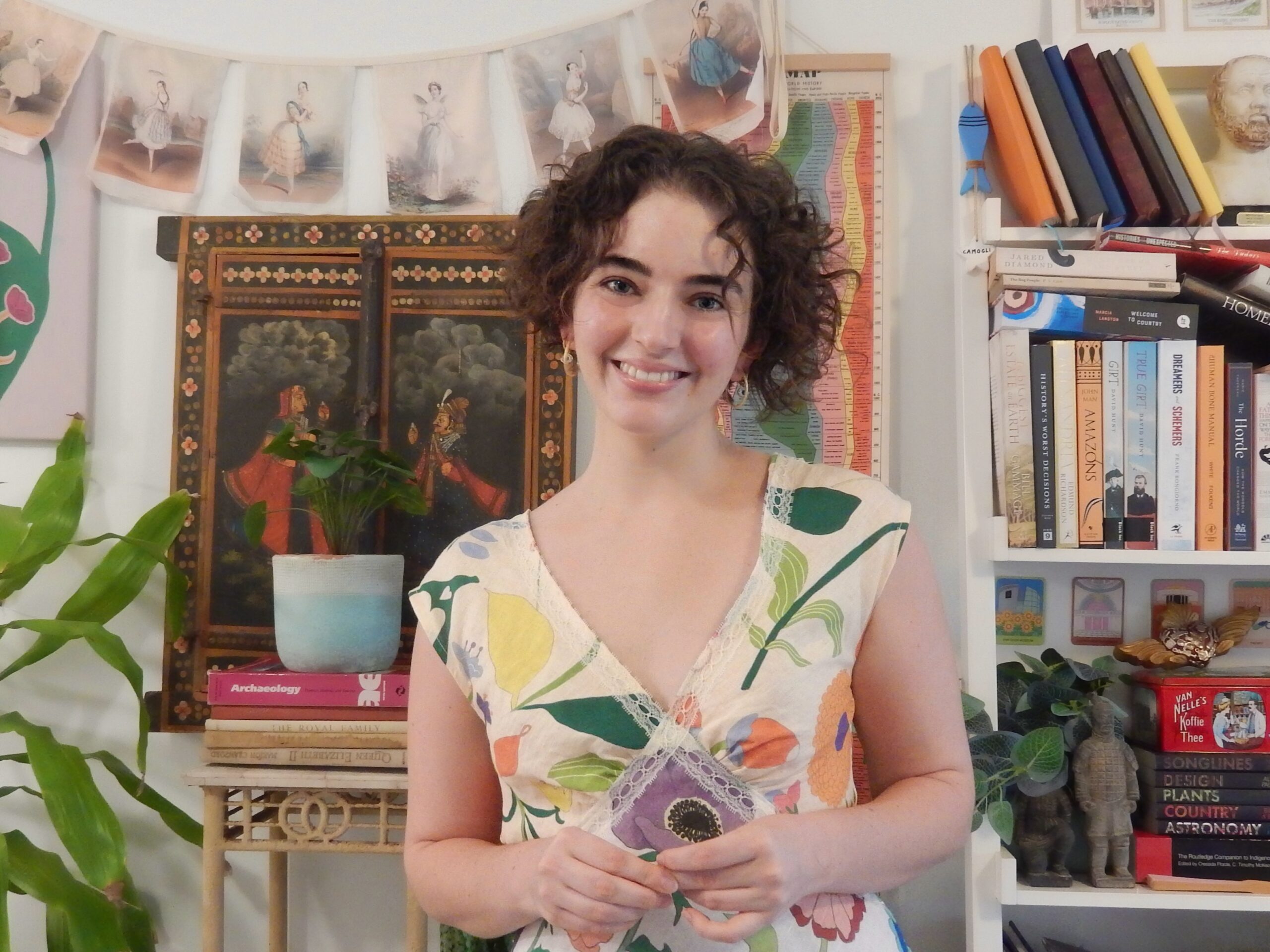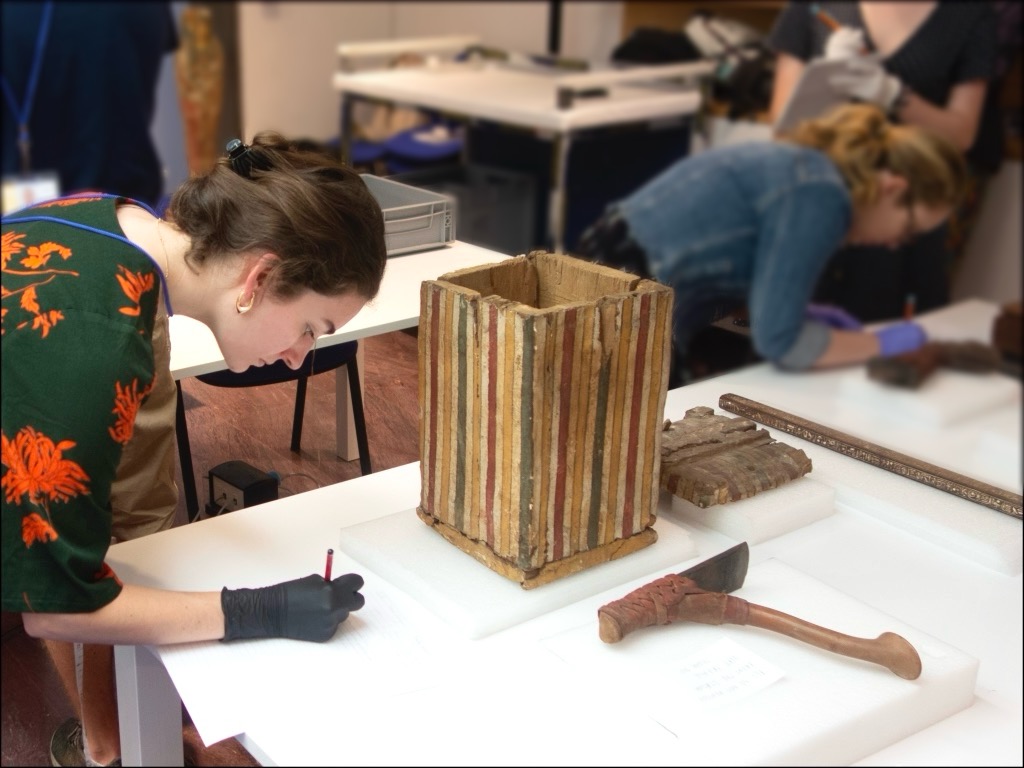
Madalyn Grant's research will focus on the emotions of repatriation practitioners when dealing with questions of past lives and deaths
We need to better understand how we research and mobilise to all aspects of the past - however emotional, however uncomfortable - in order to have productive conversations about reconciliation, repatriation and creating institutional trust
Madalyn Grant
Archaeology is a discipline that excavates the past, piecing together scant and often disparate details to answer questions about how people lived, grew, interacted and died. For Madalyn Grant [2024], this means that Archaeology is a discipline steeped in human emotions. Yet, for a subject so infused with emotion, its practitioners tend not to confront their own feelings, preferring to foreground their professional objectivity. This tendency complicates sensitive discussions, particularly when it comes to a topic like repatriation, says Madalyn.
“We need to better understand how we research and mobilise to all aspects of the past – however emotional, however uncomfortable – in order to have productive conversations about reconciliation, repatriation and creating institutional trust,” she states. “Understanding emotions has a critical role to play in these interdisciplinary and intercommunity conversations.”
 Her PhD in Archaeology [2024] will turn the microscope towards those who are involved in repatriation, about whom there is very little data. She states: “Because of a lack of data on the emotions of those who are involved in the return of Ancestral Remains, the assumption has held that Indigenous peoples are overly emotional when it comes to repatriation. Typically, Anglo practitioners – myself included – feel an obligation to pedagogies and modes of objective practice that we were taught, but these have been racialised and moralised. We need to look reflexively at these framings. I think emotions will play an important role. They rehumanise us and re-educate us. They make the field more approachable and the hard conversations more nuanced and productive.”
Her PhD in Archaeology [2024] will turn the microscope towards those who are involved in repatriation, about whom there is very little data. She states: “Because of a lack of data on the emotions of those who are involved in the return of Ancestral Remains, the assumption has held that Indigenous peoples are overly emotional when it comes to repatriation. Typically, Anglo practitioners – myself included – feel an obligation to pedagogies and modes of objective practice that we were taught, but these have been racialised and moralised. We need to look reflexively at these framings. I think emotions will play an important role. They rehumanise us and re-educate us. They make the field more approachable and the hard conversations more nuanced and productive.”
Madalyn will build on her work at the University of Queensland where she was the Repatriation Manager, and on her time at the Australian Institute of Aboriginal and Torres Strait Islander Studies where she worked in collections access, Stolen Generation family history research and legal rights. All of this also builds on her previous academic studies and an interest in History and Archaeology, which began at an early age.
Childhood
Madalyn was born in Hughenden, a small rural community in central Queensland, Australia, and is the oldest of three children. Her father is a cattle farmer, and her mother was a stay-at-home mum when she was young and now works in stakeholder relations. The family moved around with her father’s work before settling in the southeast of the state when Madalyn started primary school, but it was outside of schooling that she found her love for the past.
One weekend, when Madalyn was eight, her mum came home with a set of Horrible Histories books. She devoured them all in an afternoon. A few years later, while ‘helping’ her dad on the farm, Madalyn wandered away from the cattle yards and began reassembling the skeleton of a long-dead cow—an exercise she would repeat with greater accuracy in labs much later in life. Unlike with a missing piece of a jigsaw, when Madalyn could blame a younger brother for taking it, she realised that there was a story behind every lost tooth or rib bone. Perhaps an animal had taken it away, or a large and disruptive storm had passed through the area or it was still hidden in the dirt beneath her. “I slowly, in a childish way, began to understand that there were narratives behind objects and their absences,” she says.
Undergraduate years
As a teenager, Madalyn asked to go to a boarding school where she could more thoroughly pursue her interest in History. She attended an all-girls school about an hour from home, which encouraged her to lean into the Humanities. After graduation, she chose to do a double degree—a Bachelor of Arts, majoring in History, and a Bachelor Archaeological Practice at the Australian National University (ANU) in Canberra.
She did several internships during the course. In her first year, she went to the University of Nottingham where she researched and published on isotope analysis of human-land-animal relationships in ancient Britain. In her second year, she studied Art History in Paris and Rome; in her third year, she worked at the Museum of Australian Democracy in Canberra; and in her fourth year, she was based at the Museo Egizio in Italy. It was during her time in Italy, working with and around mummified human remains, that she began to question histories of human remains within Australian collecting and research institutions.
 On her return to Australia, Madalyn began to think about her Honours dissertation. She was initially interested in the repatriation issue and decided she wanted to write a legal history of repatriation in Australia. But it was 2020 and the emergence of the Covid pandemic had restricted access to archive material. Pivoting, she studied the first wave of the reburial movement of the 1980s and 90s and found herself increasingly angered by the arguments of those who vehemently opposed repatriation.
On her return to Australia, Madalyn began to think about her Honours dissertation. She was initially interested in the repatriation issue and decided she wanted to write a legal history of repatriation in Australia. But it was 2020 and the emergence of the Covid pandemic had restricted access to archive material. Pivoting, she studied the first wave of the reburial movement of the 1980s and 90s and found herself increasingly angered by the arguments of those who vehemently opposed repatriation.
“Paternalism and racism were rife and poorly obscured by the veneer of scientific progress,” she says. “The assumption largely held by academics at the time was that they were the people best positioned, best trained, to decide the fate of Ancestral Remains. There seemed to be little reflection on their assumptions; little acknowledgement of gatekeeping, of paternalism, of the moral imperative for material reconciliation and Indigenous bodily sovereignty.” She spoke to her supervisor who said emotions were a valid spur to inquiry and analysis.
Madalyn decided to study three repatriations: the 1989 return of the Murray Black collection [acquired by an amateur who favoured bones that showed some form of deformity or uniqueness, which then furthered scientific biases]; the 1991 return of the Kow Swamp Ancestors, dated to the Pleistocene, over which there were polarised debates as the Ancestors were both recovered by accident and by archaeological excavation; and the remains of Mungo Lady, the oldest human remains (re)discovered in Australia, dated at some 42,000 years old, which were returned in 1992 to a Keeping Place in a compromise agreement between archaeologists/the State and Aboriginal Elders. In 2022, the State government reburied Mungo Lady with limited consultation, a move that has further fuelled and dichotomised repatriation discussions.
Repatriation work
After completing her double degree and co-publishing aspects of her Honours research, Madalyn worked for the Australian Institute of Aboriginal and Torres Strait Islander Studies for a year, doing research on Indigenous family histories and legal rights. “In a lot of cases, the intellectual property of material collected by archaeologists belongs to Indigenous communities, but the physical material legally belongs to the depositors. There is no easy marriage between Indigenous Cultural Intellectual Property rights and Western property and copyright law. Daily questions, for instance, included who has the legal right to profit from material used in books or documentaries? Who gets to make that decision?” she says.
Madalyn had been contemplating starting a PhD and received a scholarship to study at the ANU, but she was offered the position of Repatriation Manager at the University of Queensland, a rare opportunity in her field. She deferred her PhD and spent the next three years auditing and conducting provenance research on holdings of Ancestral Remains and cultural heritage material across the University’s museums, departments, art galleries and properties. Madalyn worked with collections ranging from bark paintings and large rock formations to skeletal holdings and tissue samples. She produced policies to care for Ancestral Remains in all forms, contributed to Reconciliation Action Plans and organised sessions for reflection and discussion.
This repatriation work had a big emotional impact on Madalyn, recentring questions she had planned to ask in her original PhD proposal. She went back to her original PhD supervisor to refine the topic further and felt that her research would be more effective if it was based in a country with a history of being a major colonial metropole. Cambridge was her first and only choice. She received a positive response to her proposed research topic from the Department of Archaeology, despite the fact that her research will raise uncomfortable questions for the Archaeology discipline.
For her PhD, Madalyn will talk to archaeologists, museum curators, repatriation practitioners and policy workers about how they engage with their concepts of objectivity and their emotions in the work they do. She is excited to be treading new and old ground while at Cambridge, paving a smoother path for reconciliation and repatriation.












